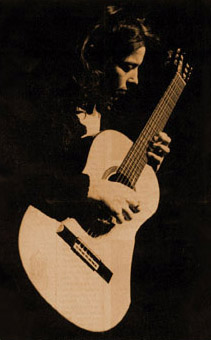A little traveling music
Dal-Educated Dale Kavanagh, international guitar virtuoso, was back for a while this winter. But if you blinked, you probably missed her.
This is not the European concert circuit where she has won rave reviews for her musical virtuosity. It’s not even the Sir James Dunn Theater in the Dalhousie Arts Center where she has delighted hundreds with her range and repertoire. It’s her cramped office in the Dalhousie Music Department, and something about the way Dale Kavanagh is playing the short, complicated classical guitar solo suggests her mind is on something else right now. Like the bags she’ll soon be packing.

It is April, and after seven months of stepping in for Dalhousie guitar master, Carol van Feggelen, who has been on sabbatical, the Nova Scotia native and Dal alumnus is coming to terms with her imminent departure. She’s thinking about engagements in the United States, Greece and Switzerland, and her first solo recording on compact disk, this summer. She’s thinking about her home in Cologne, West Germany, where she has lived for the past five years, and about leaving Nova Scotia for the second time in her life. And, she says, “I don’t want to go.”
But the world of music refuses to wait much longer for Kavanaugh. It wants her back at center stage, where the praise for her skill has been effusive. “Besides the internationally well known names like Andreas Segovia, Julian Bream and John Williams, there are quite a few guitarists who play just as well,” De Gelderlander of Holland recently gushed. “Last night, the young Canadian, Dale Kavanagh, who presented herself in Nimegen proved that point again. Musikblatt magazine of West Germany said a year ago: “The highlight of the Third Kreuzberger Guitar Days was without a doubt the Berlin Debut of Dale Kavanagh. Her concert was successful in every respect. This young guitarist amazed the Berlin public”. Guitar and Lute magazine of Sweden: “Dale Kavanagh… is comparable with the great performers and musicians.” Berliner Morgenpost of West Germany: “She is a well rounded, brilliant guitarist”.
Her awards are easily as impressive. She received top honors in 1988 at the Scandinavian International Guitar Competition; second prize at the Neuchantel International Guitar Competition in Switzerland; third prize at the Gargnamo International Competition on Italy; and third prize at the Segovia Guitar Competition in Spain. Kavanagh says classical guitarists must cultivate international reputations to survive. And at this stage in her career, she wouldn’t contemplate traveling any path other than the winding one she has chosen. But there is special poignancy in this departure. Nova Scotia, particularly Dalhousie, is where it all began for her 5 years ago.
Born in Halifax and raised in Wolfville, Kavanagh was never far from music. She started piano lessons when she was only five years old. At seven, she began clarinet; at 10, she discovered the guitar. As a teenager, she played guitar professionally in folk and jazz bands. After hearing classical guitarist Oscar Ghiglia perform in the Acadia University Performing Arts series in 1975, she decided to seek formal training. “I didn’t know what I was getting into,” she says. “I took classical guitar to improve my technique and I got hooked. I fell in love with it.”
At Dalhousie, Kavanagh studied under van Feggelen, an internationally known guitarist and teacher who had attended master classes of the great Andres Segovia. Kavanagh became so accomplished that she completed graduate studies at the Banff Canter School of Fine Arts before earning a bachelor’s degree from Dalhousie. (She has since finished her undergraduate work). She also received a Diploma di Merito from the Academia Chigiana in Siena, Italy and a Solisten Diploma from the Musik Akademie der Stadt Basel in Switzerland. Her teachers, since van Feggelen, include Eli Kassner and Oscar Ghiglia.
Kavanagh’s repertoire spans composers from renaissance to contemporary periods. The compositions are familiar to followers of classical guitar. What distinguishes her from other guitarists, according to critics, is not so much her technique, which is nonetheless superb, but her musical virtuosity. She has what one local reviewer recently characterized as a “light, precise touch… It is her musicality that impresses the most. Her Praetorious Dances from Terpsichore had the lilt and thrust on the first beats that makes early dance style come off the page… Benjamin Britten’s Nocturnal… suited Kavanagh’s intensity and musical penetration as though it had been written for her.” Kavanagh says that achieving a high level of technical skill is essential for any performer. But truly great musicians establish a signature for themselves, a sound of mood and tone that interprets the composition.
And so it is right now for her in her office at Dalhousie as she plays the brief melody quietly, delicately and, as she contemplates hitting the road again, perhaps a little mournfully.
By Alexander Bruce